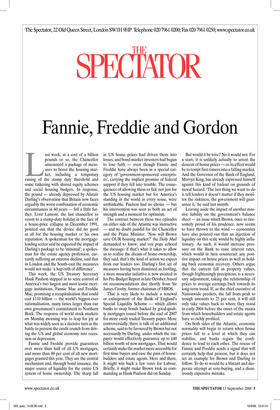Fannie, Freddie and Gordon
Last week, at a cost of a billion pounds or so, the Chancellor announced a package of measures to boost the housing market, including a temporary raising of the stamp duty threshold and some tinkering with shared equity schemes and social housing budgets. In response, the pound — already depressed by Alistair Darling’s observation that Britain now faces arguably the worst combination of economic circumstances in 60 years — fell a little further. Lord Lamont, the last chancellor to resort to a stamp-duty holiday in the face of a house-price collapse in December 1991, pointed out that the device did no good at all for the housing market or his own reputation. A spokesman for the mortgagelending sector said he expected the impact of Darling’s package to be ‘minimal’; a spokesman for the estate agency profession, currently suffering an extreme decline, said that in London and the South-east the measures would not make ‘a hap’orth of difference’.
This week, the US Treasury Secretary Hank Paulson stepped in to seize control of America’s two largest and most iconic mortgage institutions, Fannie Mae and Freddie Mac, promising a recapitalisation that could cost £110 billion — the world’s biggest-ever nationalisation, many times larger than our own government’s commitment to Northern Rock. The response of world stock markets on Monday morning was to leap for joy at what was widely seen as a decisive turn in the battle to prevent the credit crunch from driving the US and global economy into recession or depression.
Fannie and Freddie provide guarantees over more than half of all US mortgages, and more than 80 per cent of all new mortgages granted this year. They are the central mechanism and, through bond issuance, the major source of liquidity for the entire US system of home ownership. The sharp fall in US house prices had driven them into losses, and bond-market investors had begun to lose faith — even though Fannie and Freddie have always been in a special category of ‘government-sponsored enterprises’, carrying the implicit promise of federal support if they fell into trouble. The consequences of allowing them to fail, not just for the US housing market but for America’s standing in the world in every sense, were unthinkable. Paulson had no choice — but his intervention was seen as both an act of strength and a moment for optimism.
The contrast between these two episodes on either side of the Atlantic was instructive — and no doubt painful for the Chancellor and the Prime Minister. ‘Now will Brown save OUR housing market?’ the Daily Mail demanded to know; and vox pops echoed the message: if that’s what it takes to allow us to realise the dream of home-ownership, they said, that’s the kind of action we expect from our leaders too. Darling’s first set of measures having been dismissed as footling, a more muscular initiative is now awaited in his Pre-Budget Report in late October, based on recommendations due shortly from Sir James Crosby, former chairman of HBOS.
That is very likely to include a renewal or enlargement of the Bank of England’s Special Liquidity Scheme — which allows banks to swap bonds backed by good-quality mortgages issued before the end of 2007 for more easily traded Treasury paper. More controversially, there is talk of an additional scheme, said to be favoured by Brown but not necessarily by Darling, under which the taxpayer would effectively guarantee up to £40 billion worth of new mortgages. That would certainly make the market more accessible for first-time buyers and ease the pain of housebuilders and estate agents. Here and there, it might win back a few votes for Labour. Briefly, it might make Brown look as commanding as Hank Paulson did on Sunday. But would it be wise? No it would not. For a start, it is unlikely actually to arrest the descent of house prices — so its effect would be to tempt first-timers into a falling market. And the Governor of the Bank of England, Mervyn King, has already expressed himself against this kind of bailout on grounds of moral hazard: ‘The last thing we want to do is tell lenders it doesn’t matter if they monitor the riskiness, the government will guarantee it,’ he said last month.
Leaving aside the impact of another massive liability on the government’s balance sheet — an issue which Brown, once so tiresomely proud of his prudence, now seems to have thrown to the wind — economists have also pointed out that an injection of liquidity on this scale would be highly inflationary. As such, it would increase pressure on the Bank to raise interest rates, which would in turn counteract any positive impact on house prices as well as holding back economic recovery. Others argue that the current fall in property values, though frighteningly precipitous, is a necessary adjustment, taking the relationship of prices to average earnings back towards its long-term trend. If, as the chief executive of Nationwide predicts, the fall from peak to trough amounts to 25 per cent, it will still only take values back to where they stood in early 2004 before the onset of the mania from which housebuilders and estate agents have so richly profited.
On both sides of the Atlantic, economic normality will begin to return when house prices fall to a level at which they can stabilise, and banks regain the confidence to lend to each other. The rescue of Fannie and Freddie sends a signal that will certainly help that process, but it does not set an example for Brown and Darling to follow. To do so would be a blatant and desperate attempt at vote-buying, and a disastrously expensive mistake.










































































 Previous page
Previous page